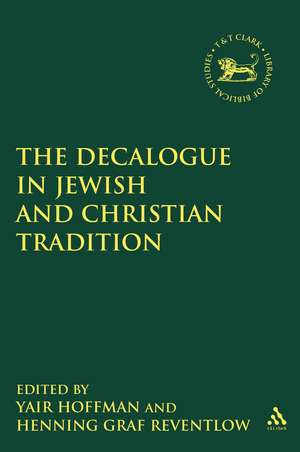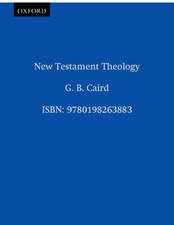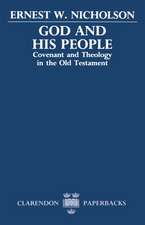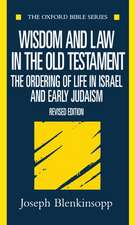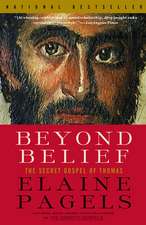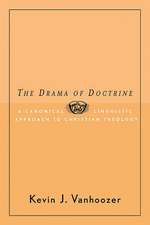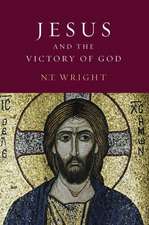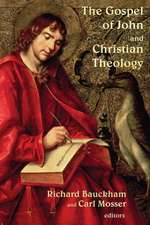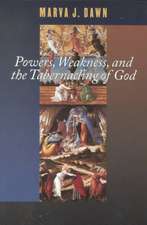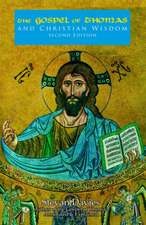The Decalogue in Jewish and Christian Tradition: The Library of Hebrew Bible/Old Testament Studies
Editat de Henning Graf Reventlow, Professor Yair Hoffmanen Limba Engleză Paperback – 17 oct 2012
This collection of papers arrives from the eighth annual symposium between the Chaim Rosenberg School of Jewish Studies of Tel Aviv University and the Faculty of Protestant Theology of the University of Ruhr, Bochum held in Bochum, June 2007. The general theme of the Decalogue was examined in its various uses by both Jewish and Christian traditions throughout the centuries to the present.
Three papers deal with the origin of the Decalogue: Yair Hoffman on the rare mentioning of the Decalogue in the Hebrew Bible outside the Torah; E. L. Greenstein considers that already A. ibn Ezra doubted that God himself spoke in the Ten Commandments and states that more likely their rhetoric indicates it was Moses who proclaimed the Decalogue; A. Bar-Tour speaks about the cognitive aspects of the Decalogue revelation story and its frame.
The second part considers the later use of the Decalogue: G. Nebe describes its use with Paul; P. Wick discusses the symbolic radicalization of two commandments in James and the Sermon on the Mount; A. Oppenheimer explains the removal of the Decalogue from the daily Shem'a prayer as a measure against the minim's claim of a higher religious importance of the Decalogue compared to the Torah; W. Geerlings examines Augustine's quotations of the Decalogue; H. Reventlow depicts its central place in Luther's catechisms; Y. Yacobson discusses its role with Hasidism.
The symposium closes with papers on systematic themes: C. Frey follows a possible way to legal universalism; G. Thomas describes the Decalogue as an "Ethics of Risk"; F. H. Beyer/M. Waltemathe seek an educational perspective.
Three papers deal with the origin of the Decalogue: Yair Hoffman on the rare mentioning of the Decalogue in the Hebrew Bible outside the Torah; E. L. Greenstein considers that already A. ibn Ezra doubted that God himself spoke in the Ten Commandments and states that more likely their rhetoric indicates it was Moses who proclaimed the Decalogue; A. Bar-Tour speaks about the cognitive aspects of the Decalogue revelation story and its frame.
The second part considers the later use of the Decalogue: G. Nebe describes its use with Paul; P. Wick discusses the symbolic radicalization of two commandments in James and the Sermon on the Mount; A. Oppenheimer explains the removal of the Decalogue from the daily Shem'a prayer as a measure against the minim's claim of a higher religious importance of the Decalogue compared to the Torah; W. Geerlings examines Augustine's quotations of the Decalogue; H. Reventlow depicts its central place in Luther's catechisms; Y. Yacobson discusses its role with Hasidism.
The symposium closes with papers on systematic themes: C. Frey follows a possible way to legal universalism; G. Thomas describes the Decalogue as an "Ethics of Risk"; F. H. Beyer/M. Waltemathe seek an educational perspective.
| Toate formatele și edițiile | Preț | Express |
|---|---|---|
| Paperback (1) | 255.66 lei 43-57 zile | |
| Bloomsbury Publishing – 17 oct 2012 | 255.66 lei 43-57 zile | |
| Hardback (1) | 830.78 lei 43-57 zile | |
| Bloomsbury Publishing – 23 feb 2011 | 830.78 lei 43-57 zile |
Din seria The Library of Hebrew Bible/Old Testament Studies
- 30%
 Preț: 599.90 lei
Preț: 599.90 lei -
 Preț: 159.16 lei
Preț: 159.16 lei - 30%
 Preț: 541.20 lei
Preț: 541.20 lei - 23%
 Preț: 192.01 lei
Preț: 192.01 lei -
 Preț: 99.40 lei
Preț: 99.40 lei - 30%
 Preț: 509.52 lei
Preț: 509.52 lei - 23%
 Preț: 192.36 lei
Preț: 192.36 lei - 30%
 Preț: 509.93 lei
Preț: 509.93 lei -
 Preț: 222.84 lei
Preț: 222.84 lei -
 Preț: 168.53 lei
Preț: 168.53 lei - 30%
 Preț: 655.82 lei
Preț: 655.82 lei - 22%
 Preț: 568.27 lei
Preț: 568.27 lei - 23%
 Preț: 190.50 lei
Preț: 190.50 lei -
 Preț: 472.27 lei
Preț: 472.27 lei - 30%
 Preț: 665.45 lei
Preț: 665.45 lei - 23%
 Preț: 193.80 lei
Preț: 193.80 lei - 30%
 Preț: 656.06 lei
Preț: 656.06 lei - 30%
 Preț: 538.77 lei
Preț: 538.77 lei - 24%
 Preț: 508.76 lei
Preț: 508.76 lei -
 Preț: 168.75 lei
Preț: 168.75 lei -
 Preț: 472.22 lei
Preț: 472.22 lei -
 Preț: 172.88 lei
Preț: 172.88 lei - 30%
 Preț: 510.04 lei
Preț: 510.04 lei - 30%
 Preț: 893.55 lei
Preț: 893.55 lei - 30%
 Preț: 508.44 lei
Preț: 508.44 lei - 30%
 Preț: 598.02 lei
Preț: 598.02 lei - 30%
 Preț: 774.62 lei
Preț: 774.62 lei - 30%
 Preț: 509.52 lei
Preț: 509.52 lei -
 Preț: 470.74 lei
Preț: 470.74 lei -
 Preț: 170.01 lei
Preț: 170.01 lei - 30%
 Preț: 714.35 lei
Preț: 714.35 lei - 30%
 Preț: 773.71 lei
Preț: 773.71 lei - 27%
 Preț: 1122.64 lei
Preț: 1122.64 lei - 22%
 Preț: 1122.47 lei
Preț: 1122.47 lei - 22%
 Preț: 1125.50 lei
Preț: 1125.50 lei - 22%
 Preț: 1066.87 lei
Preț: 1066.87 lei - 22%
 Preț: 1121.17 lei
Preț: 1121.17 lei - 22%
 Preț: 1005.18 lei
Preț: 1005.18 lei - 22%
 Preț: 1123.94 lei
Preț: 1123.94 lei - 22%
 Preț: 1131.53 lei
Preț: 1131.53 lei - 22%
 Preț: 768.98 lei
Preț: 768.98 lei - 22%
 Preț: 1120.52 lei
Preț: 1120.52 lei - 22%
 Preț: 827.69 lei
Preț: 827.69 lei - 22%
 Preț: 889.49 lei
Preț: 889.49 lei - 30%
 Preț: 714.27 lei
Preț: 714.27 lei - 22%
 Preț: 1128.93 lei
Preț: 1128.93 lei - 22%
 Preț: 1125.82 lei
Preț: 1125.82 lei - 22%
 Preț: 1064.75 lei
Preț: 1064.75 lei - 22%
 Preț: 893.15 lei
Preț: 893.15 lei - 18%
 Preț: 384.21 lei
Preț: 384.21 lei
Preț: 255.66 lei
Nou
Puncte Express: 383
Preț estimativ în valută:
48.92€ • 51.21$ • 40.48£
48.92€ • 51.21$ • 40.48£
Carte tipărită la comandă
Livrare economică 07-21 aprilie
Preluare comenzi: 021 569.72.76
Specificații
ISBN-13: 9780567179241
ISBN-10: 0567179249
Pagini: 192
Ilustrații: 4 illus
Dimensiuni: 156 x 234 x 10 mm
Greutate: 0.27 kg
Editura: Bloomsbury Publishing
Colecția T&T Clark
Seria The Library of Hebrew Bible/Old Testament Studies
Locul publicării:New York, United States
ISBN-10: 0567179249
Pagini: 192
Ilustrații: 4 illus
Dimensiuni: 156 x 234 x 10 mm
Greutate: 0.27 kg
Editura: Bloomsbury Publishing
Colecția T&T Clark
Seria The Library of Hebrew Bible/Old Testament Studies
Locul publicării:New York, United States
Caracteristici
This book contains the papers read at the eighth symposium between the Chaim Rosenberg School of Jewish Studies of Tel Aviv University and the Faculty of Protestant Theology of the University of the Ruhr, Bochum, held in Bochum, June 2007.
Notă biografică
H. Graf Reventlow, was an Emeritus Professor of Old Testament at University of the Ruhr, Bochum. His most important recent publication is the book series Epochen der Bibelauslegung (4 vol.). English translation in preparation.
Y. Hoffman is an Emeritus Professor of Bible at Tel-Aviv University. He has published books on various biblical topics such as: of the Exodus; Prophecies Against Foreign nations; The book of Job; recently he has published a 2 volumes' commentary on the Book of Jeremiah.
Y. Hoffman is an Emeritus Professor of Bible at Tel-Aviv University. He has published books on various biblical topics such as: of the Exodus; Prophecies Against Foreign nations; The book of Job; recently he has published a 2 volumes' commentary on the Book of Jeremiah.
Cuprins
Part I. THE HEBREW BIBLE AND THE NEW TESTAMENT
Yair Hoffman, The Biblical Status of the Decalogue.
Ed Greenstein, The Rhetoric of the Ten Commandments.
Asnat Bar Tour, Seeing Thunder: Narrative Images of the Ten Commandments.
Gottfried Nebe, The Decalogue with Paul, especially in his Letter to the Romans.
Peter Wick, "You shall not murder", "You shall not commit adultery". Theological and anthropological radicalization in the letter of James and in the Sermon on the Mount.
Part II. LATER DEVELOPMENTS
Aharon Oppenheimer, Removing the Decalogue from the Shem'a and Phylacteries: the historical implications.
Wilhelm Geerlings, The Decalogue with Augustine.
Henning Graf Reventlow, The Ten Commandments in Martin Luther's Catechisms.
Yoram Jacobson, The Meaning and Significance of the Commandments according to the Mystical World of Habad Hasidim.
Part III. SYSTEMATIC REFLECTIONS
Christofer Frey, Natural Right, Law, Commandment - Conditions for the Reception of the Decalogue since the Reformation.
Guenter Thomas, The Ten Commandments in an Ethics of Risk.
Franz Heinrich Beyer / Michael Waltemathe, The Good , the Bad and the Undecided. Cultural Echoes of the Decalogue. An educational perspective
Yair Hoffman, The Biblical Status of the Decalogue.
Ed Greenstein, The Rhetoric of the Ten Commandments.
Asnat Bar Tour, Seeing Thunder: Narrative Images of the Ten Commandments.
Gottfried Nebe, The Decalogue with Paul, especially in his Letter to the Romans.
Peter Wick, "You shall not murder", "You shall not commit adultery". Theological and anthropological radicalization in the letter of James and in the Sermon on the Mount.
Part II. LATER DEVELOPMENTS
Aharon Oppenheimer, Removing the Decalogue from the Shem'a and Phylacteries: the historical implications.
Wilhelm Geerlings, The Decalogue with Augustine.
Henning Graf Reventlow, The Ten Commandments in Martin Luther's Catechisms.
Yoram Jacobson, The Meaning and Significance of the Commandments according to the Mystical World of Habad Hasidim.
Part III. SYSTEMATIC REFLECTIONS
Christofer Frey, Natural Right, Law, Commandment - Conditions for the Reception of the Decalogue since the Reformation.
Guenter Thomas, The Ten Commandments in an Ethics of Risk.
Franz Heinrich Beyer / Michael Waltemathe, The Good , the Bad and the Undecided. Cultural Echoes of the Decalogue. An educational perspective
Recenzii
Mentioned in Hebrew Studies, Volume LII.
